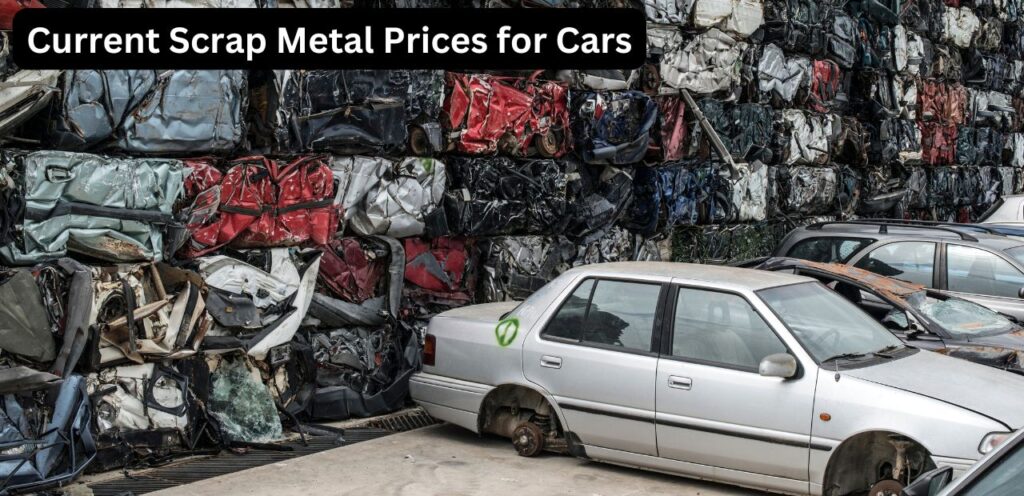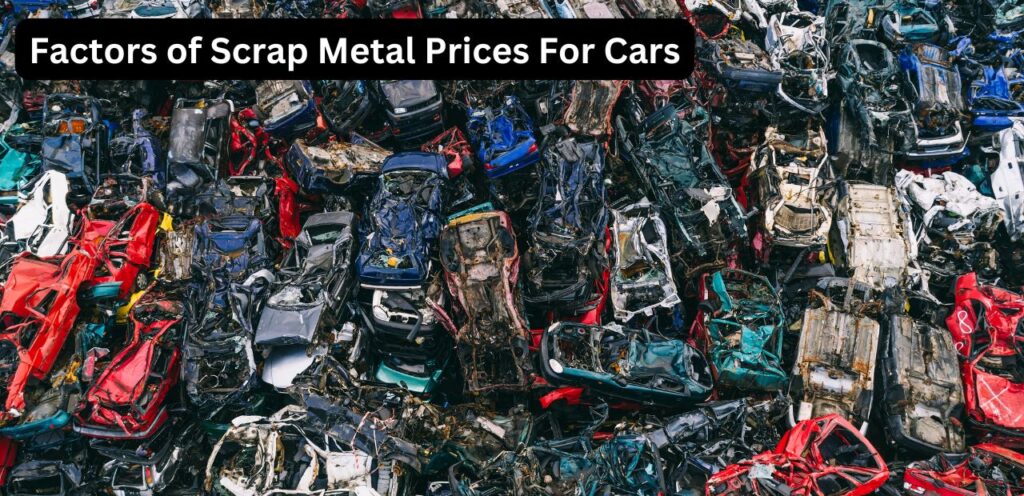Scrap Metal Prices For Cars
Scrap metal prices for cars have become a significant topic for those looking to dispose of their vehicles in an environmentally friendly and profitable manner.
The value of scrap metal, especially when it comes to cars, involves a deep dive into various factors, including market trends, the types of metals within a vehicle, and regional variations that affect pricing. Whether you’re a seasoned scrapper or new to the concept, this guide will walk you through the essentials.
Today Scrap Metal Prices For Cars
As of September 2024, scrap prices for cars generally range from around £150 to £500, depending on the size and weight of the vehicle. Let’s look at the breakdown of average prices:
- Small cars: £150 – £300
- Mid-sized cars: £225 – £390
- Larger vehicles (e.g., SUVs, trucks): £500+
The price per ton for scrap cars is approximately £155 – £195 per ton, with larger vehicles fetching higher values due to the quantity of metal and salvageable components like catalytic converters, which themselves can fetch extra depending on their condition and materials.
Current Scrap Metal Prices for Cars

The current scrap metal prices for cars fluctuate based on several factors, including global demand for metals, economic conditions, and changes in market dynamics. Prices are also influenced by the specific components within a vehicle.
The value of scrap metal today is often determined by the type of metal, such as steel, aluminum, and copper, and their respective weights. To get the most accurate and up-to-date pricing, many scrappers rely on resources like the Scrapsy App, which provides real-time charts and data.
In today’s market, steel and iron typically make up the bulk of a car’s scrap value, given their abundance in most vehicles. However, other materials like aluminum and copper, found in various parts of the car, also contribute significantly to the overall scrap price.
The fluctuation of these prices can be tracked by observing market trends over days, weeks, or even years, as changes in the economy, the price of raw materials, and environmental policies all play a role in determining value. Interested in Scrap Metal Prices Eugene Oregon? Scrapsy provides you it!
Steel and Iron
Steel and iron are two of the most common metals found in cars, and they make up a substantial portion of the vehicle’s weight.
The price for steel and iron is generally measured per ton, and this price can vary significantly based on the market conditions at the time of scrapping. Ferrous scrap, which includes both steel and iron, is highly recyclable and is often in high demand for use in construction and manufacturing.
Given their widespread use, the scrap metal prices for steel and iron are closely monitored by those in the industry. Scrappers often rely on data from trusted sources to determine the best time to sell these materials, as the price can swing based on factors like global steel production rates, tariffs, and changes in demand.
Additionally, the quality of the steel and iron, such as whether it is alloyed or pure, can also impact the price you receive.
Catalytic Converters
Catalytic converters are one of the most valuable components of a scrapped car due to the precious metals they contain.
These components are rich in platinum, palladium, and rhodium, metals that have a high market value and are crucial in reducing vehicle emissions. The scrap price for catalytic converters can often exceed the value of other parts of the car, making them a prime target for scrappers.
The value of catalytic converters can vary greatly depending on the type of vehicle and the specific metals used. The price of these precious metals is influenced by global supply and demand, particularly in industries that require these materials for production.
With the rise in the popularity of electric and hybrid vehicles, the demand for catalytic converters might see shifts in the future, impacting their scrap value.
Aluminum
Aluminum is another significant metal found in cars, especially in components like the engine, wheels, and body panels. The scrap price for aluminum is usually calculated per pound, and it tends to be higher than steel due to its lower weight and higher market demand. Aluminum is prized in the recycling industry for its durability and recyclability, making it a valuable material in the scrap market.
The price of aluminum can be influenced by various factors, including global production rates, tariffs, and the overall demand for lightweight metals in industries like automotive and aerospace. Scrappers looking to maximize their return on aluminum should keep an eye on market trends and consider timing their sales to coincide with periods of higher demand.
Copper
Copper is found in several car components, including wiring, radiators, and motors. It’s one of the most valuable metals per pound, making it a key target for those scrapping cars.
The price of copper can be tracked through various market reports and apps, and it tends to fluctuate based on global demand, particularly from industries like construction and electronics.
Copper’s high conductivity and malleability make it a sought-after material in various industries, which contributes to its high scrap value.
The market for copper is often volatile, influenced by factors such as mining output, geopolitical events, and shifts in technology that either increase or decrease demand for copper wiring and components.
Other Components
Apart from the primary metals like steel, aluminum, and copper, cars contain other components that can be valuable in the scrap market.
These include metals like brass, zinc, and lead, found in various parts such as batteries, radiators, and spark plugs. The value of these metals can vary, but they contribute to the overall scrap price of the vehicle.
The scrap value of these components is often overlooked by casual scrappers, but knowledgeable individuals can capitalize on these materials to maximize their returns.
For instance, brass, often found in fittings and radiators, can fetch a good price per pound, while lead, commonly used in car batteries, is also in demand in the recycling industry.
Regional Variations
The price of scrap metal for cars can vary significantly depending on your location. Regional differences in scrap yard operations, local demand for metals, and transportation costs all play a role in determining the final price you’ll receive.
In some states, the scrap price might be higher due to proximity to recycling centers or higher local demand for certain metals.
Additionally, regulations and policies at the state or local level can impact the scrap metal market. For example, environmental regulations might restrict the export of certain metals, driving up local demand and prices.
Conversely, regions with abundant access to raw materials might see lower scrap prices due to less reliance on recycled metals.
Types of Metals in Cars
Cars are composed of a wide range of metals, each with its own value in the scrap market. The most common metals found in vehicles include steel, aluminum, and copper, but other metals like brass, zinc, and lead also play a role in the overall scrap value.
The composition of these metals can help scrappers determine which parts of the car are most valuable.
Each metal type has unique properties that make it suitable for different applications within the vehicle. For instance, steel is used for structural components due to its strength, while aluminum is favored for its lightweight properties.
Knowing where these metals are located in the car can help scrappers efficiently dismantle the vehicle and maximize the return on their efforts.
Factors of Scrap Metal Prices For Cars

Several factors influence the scrap metal prices for cars, including market conditions, the quality of the metals, and the time of year. Economic factors such as global demand for raw materials, changes in tariffs, and fluctuations in currency exchange rates can all impact the price of scrap metals.
Additionally, environmental policies and regulations can also play a role, particularly if they affect the supply of raw materials or the demand for recycled metals.
The condition of the car and its components can also affect the price you receive. For example, cars with a high percentage of valuable metals like copper or aluminum may fetch a higher price than those composed mainly of steel.
The presence of non-metallic materials, such as plastics or rubber, can reduce the overall value of the scrap.
Value Of Your Scrapped Car
The value of your scrapped car is determined by the sum of its parts and the current market prices for the metals it contains.
The weight of the car, the type of metals used, and the current demand for those metals all play a role in determining the final value. Many scrappers use online tools or apps to get an estimate of their car’s scrap value, but the final price is often determined by the scrap yard after a thorough inspection.
It’s important to consider that different scrap yards may offer different prices for the same vehicle. Some yards may specialize in certain types of metals or components, allowing them to offer a higher price for those materials.
Additionally, yards in regions with high demand for scrap metal may offer better prices than those in areas with less demand.
Benefits of Scrapping Your Car
Scrapping your car offers several benefits, both financially and environmentally. Financially, scrapping allows you to recoup some of the value of your old vehicle, which can be especially useful if the car is no longer drivable or worth repairing.
The money earned from scrapping can be put toward a new vehicle or used for other expenses.
Environmentally, scrapping your car helps reduce waste and supports the recycling industry. By scrapping your vehicle, you’re contributing to the recycling of valuable metals, reducing the need for mining new materials, and helping to conserve natural resources.
Additionally, scrapping prevents harmful chemicals and materials from leaking into the environment, as scrap yards are equipped to handle these substances safely.
Conclusion
Scrap metal prices for cars is essential for anyone looking to make the most out of their old vehicle. The value of scrap metals like steel, aluminum, and copper fluctuates based on various factors, including market demand, regional variations, and the specific components within the car.
By staying informed and using tools like the Scrapsy App, you can maximize the return on your scrapped vehicle and contribute to environmental sustainability through metal recycling.
Whether you’re scrapping a car for the first time or are a seasoned professional, knowing the ins and outs of scrap metal pricing will ensure you get the best value for your efforts.
